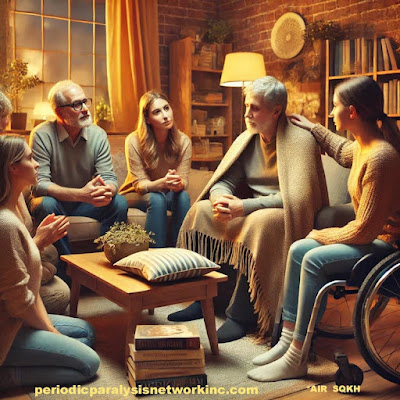Communicating Needs and Managing
Relationships with Family and Friends Regarding Periodic Paralysis (PP)
Managing relationships with family and friends when living with Periodic
Paralysis (PP) can be challenging, especially when they may not fully
understand the condition. Here are some strategies and tips to effectively
communicate your needs and manage these relationships:
1. Educate Your Loved Ones
- Informational Sessions: Organize informal sessions
where you can share information about PP. Use reliable sources to explain
the condition, its symptoms, and how it affects your daily life.
- Written Materials: Provide pamphlets, articles, or
books that explain PP in detail (our PPN books). Websites like the
National Organization for Rare Disorders (NORD) or academic journals can
be good resources.
2. Open and Honest Communication
- Express Your Feelings: Share your feelings and
experiences openly. Let your loved ones know how PP impacts you
emotionally and physically.
- Be Specific About Needs: Clearly articulate what you
need from your family and friends. Whether it’s help with daily tasks,
emotional support, or simply understanding your limitations, being
specific can help.
3. Set Boundaries and Expectations
- Define Boundaries: Clearly define what you can and
cannot do. This helps manage expectations and reduce frustration on both
sides.
- Consistent Communication: Keep communication consistent.
Regularly updating your loved ones about your condition and any changes
can help them stay informed and supportive.
4. Involve Them in Your Care
- Care Team: Involve family and friends in
your care routine where possible. This could include attending medical
appointments or helping with specific tasks.
- Shared Responsibilities: Delegate tasks that you cannot
perform during an episode. This not only helps you but also allows them to
contribute and understand your condition better.
5. Use Support Groups and Resources
- Support Groups: Encourage your family and
friends to attend support group meetings or online forums with you.
Hearing from others who have similar experiences can be enlightening.
- Professional Counseling: Sometimes, professional help
can bridge the understanding gap. Family therapy or counseling sessions
can be beneficial.
6. Utilize Communication Tools
- Medical Alerts: Use medical alert bracelets or
apps that can quickly inform others about your condition in case of an
emergency.
- Action Plans: Create and share an action plan
for what to do during a PP episode. Ensure that your family and friends
know how to respond appropriately.
7. Practice Patience and Empathy
- Understand Their Perspective: Acknowledge that it might be
difficult for them to fully grasp what you are going through. Patience and
empathy can go a long way in fostering mutual understanding.
- Celebrate Small Victories: Recognize and celebrate their
efforts to understand and support you, no matter how small. Positive
reinforcement can encourage more supportive behavior.
8. Adapt Communication Styles
- Tailor Your Approach: Different people respond to
different communication styles. Tailor your approach based on whether your
loved one prefers detailed information, emotional conversations, or visual
aids.
By implementing these strategies, you can foster better understanding and
support from your family and friends, ultimately improving your relationships
and quality of life. Remember, effective communication is a two-way street and
requires effort from both sides to be truly successful.
References
- National Organization for Rare Disorders (NORD). (n.d.). Primary Periodic Paralysis. Retrieved from https://rarediseases.org/rare-diseases/primary-periodic-paralysis/
- Mayo Clinic Staff. (2022). Periodic Paralysis. Mayo Clinic. Retrieved from https://www.mayoclinic.org/diseases-conditions/periodic-paralysis/symptoms-causes/syc-20355591
- Office of Rare Diseases Research
(ORDR-NCATS). (n.d.). Periodic Paralysis. Genetic and Rare Diseases
Information Center (GARD). Retrieved from https://rarediseases.info.nih.gov/diseases/7422/periodic-paralysis
Image
depicts a warm and supportive scene, emphasizing empathy and understanding for
a person with Periodic Paralysis during a heartfelt conversation with family
and friends


No comments:
Post a Comment